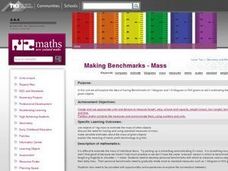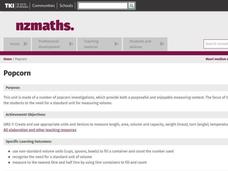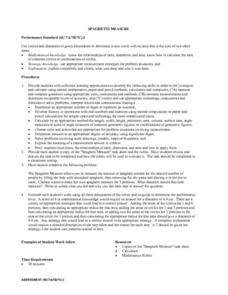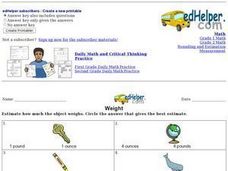Curated OER
Working Watermelon
You're going to wish you had a watermelon for this lesson! Class members read about watermelons and make a salad in class to sample. They also perform estimates, measurements and calculations on a watermelon. They predict what percentage...
Curated OER
Weight
In this estimating weights of objects worksheet, students observe objects, estimate the metric measurements, and choose the best answer. Students solve 9 problems.
Curated OER
Taking Estimation and Measurement Outside
Eighth graders gain a better understanding of visual distances and estimation. They actively practice using metric measurement and conversion. Students practice cooperative exploring and team building.
Curated OER
Teddy Bears and Friends
Children begin by making direct comparisons between objects and putting a number of objects into order according to length. They are also introduced to measuring with multi-link cubes which allows them to compare objects which cannot be...
Curated OER
Pacing a Gunther Chain
Students pace a Gunther Chain, a measurement used by foresters to determine distance and area. They discuss that pacing is individualized depending on age, gender, etc. They practice to find an average pace. Teams estimate, pace and...
Curated OER
Making Benchmarks - Mass
Elementary schoolers predict the mass for different objects. Then, using objects of 1kg mass, they make a more precise prediction. Afterwards, they discuss the need for having and using standard measures of mass.
Curated OER
Popcorn
Hungry learners perform a number of popcorn investigations. They investigate the volume of popcorn kernels before and after popping. They use both standard and non-standard units of measurement to measure the kernels.
Curated OER
Perimeter All Around
Students explore perimeter and area of regular and irregular polygons. They experiment with color squares and create different arrangements using the same number squares. Then they compare the area and perimeter measurements of each.
Curated OER
Measurement
Second graders practice measuring and estimating the length of two objects. They answer questions related to these topics and then work together in parts to complete a worksheet.
Curated OER
How Close Is Our Estimate?
Fifth graders estimate perimeter, area, and volume. They measure perimeter and area using nonstandard units of measurement. Students add and subtract non-standard units of measurement. They add mixed numbers and simplify the sum.
Curated OER
Measurement and the Illampi Mound Colony
Students comprehend the basic units of measurement, scale, plotting, and basic grids. Students practice their estimation
and measuring skills and will demonstrate their ability to work well in groups.
Curated OER
Studying Fossils: Dinosaur Tracks From Stride to leg Length to Speed
Students explore dinosaurs. Students determine the relationship between leg length, stride length, and speed in humans and bipedal dinosaurs. Students analyze collected information. Based upon the data, dinosaur tracks, and fossils,...
Curated OER
Spaghetti Measure
Students receive a copy of a "Spaghetti Measure" task sheet along with the scoring rubric. Students preview the task and the rubric prior to starting the task. tudeThey determine the circumference of a circle of spaghetti that will...
Curated OER
Measuring a Mummy Case
Middle schoolers practice how to calculate volume using mummy cases. They measure using ancient Egyptian, U.S., and metric systems. They explore how to convert measurements into different systems, and discuss ratios.
Curated OER
Measuring Vibration of Energy
In this chemistry worksheet, students measure the different vibration levels of energy. They use the fundamental vibration frequency formula to calculate the Morse potential for a given chemical bond. There are 2 questions.
Curated OER
Hands On: Centimeters and Millimeters
In this centimeter/millimeter worksheet, students estimate the length of pictures of tropical fish, then measure each to the nearest centimeter and use the measurements to solve 2 problems, then solve 2 additional problems.
Curated OER
How Big is an Oil Tanker
Young scholars measure out 100 feet to get an idea of how long an oil tanker is. In this measurement lesson, students sketch an oil tanker using the appropriate scale, after they have an idea of how large an actual oil tanker is.
Curated OER
Weight - Ounces and Pounds
In this measurement worksheet, 3rd graders estimate how much each of 9 objects weighs in ounces and pounds. They circle the answer that gives the best estimate of the weight of objects which include a key, an elephant, a chair, and a...
Curated OER
Measurement
Students use arithmetic in a practical situation using time and distance.
As the calculations involved in this problem involve single digit addition and multiplication it offers a good opportunity to encourage the students's use of...
Bowland
Highway Link Design
Discover a renewed appreciation for the highway transportation department. with a lesson that has scholars design a highway route that meets certain conditions, including traffic flow, curves, speed limits, financial costs, and...
Curated OER
Does Sunlight Effect Leaf Size?
Students make estimates and then measure leaves for accuracy. They calculate the area of the leaves by drawing an outline on graph paper and counting the squares. They compare the leaves exposed to sunlight to those that are in constant...
101 Questions
Oversize Tires
Big vehicles require some big tires. Given a picture of a flatbed hauling a large tire, scholars discuss and estimate the size of the tire. They then use information and video about the tires to estimate the height of a vehicle that uses...
Curated OER
Moving Day!
Eighth graders continue their geometry unit by focusing on volume. Using data, they create a spreadsheet, estimate and calculate volume. They solve real-life problems and round their answers to the hundredths place. They also practice...
Curated OER
Pumpkin Problems
Students participate in a lesson that has the intention of working on estimation skills. They use pumpkins to estimate the number of seeds are inside. They collect data for each pumpkin and compare it to the estimation. Students question...

























